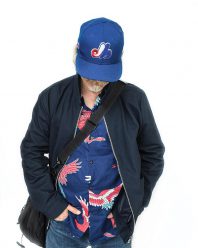
I anledning af vores besøg på TIFF har vi interviewet deres festivalplanlægger, Steve Gravestock, der tager sig af det nordiske verdenskort. Det blev til en lang snak om blandt andet hans store kærlighed for Thomas Vinterberg og Trine Dyrholm, men også de nye film, der har premiere i år, inklusiv danske I blodet af Rasmus Heisterberg, der har verdenspremiere i Toronto. Her er et udsnit af samtalen:
Thank you for taking the time. Here in the beginning I just want to ask you, very quickly, what exactly a festival programmer does seeing, as most people might not know that?
Steve Gravestock: We are the people who select the film that we screen. The way it is done is that you typically are assigned to a geographic region. I have a couple. I do the Nordic countries, I have done some of the Baltic countries, I have done the Philippines and I do Canada as well. There are a lot of programmers, who have similar territories. We usually spent a certain amount of time in that territory, like a week or two in the region. Of course, my week is usually spent in a screening room, but that is basically what you do.
You research the territory, try to find out what is coming up and what you might be interested, or the audience in Toronto is interested in. You try to find the best films that year, and we have been lucky, because we have managed to build up a pretty serious interest in Toronto. There are quite a lot of people who avidly follow Nordic films, partly because Toronto is pretty diverse in terms of ethnicity and background, but also because they are very avid film fans. For example Anders Thomas Jensen has a fan base that extends to his script, people like Susanne Bier, Thomas Vinterberg, Baltasar Kormákur, Ole Christian Madsen. They follow directors very enthusiastically, so it is quite easy to program that way.
Although this year we have so many first time features, which is kind of cool.

© George Pimentel
That is actually one of the things I wanted to ask you, because on the one hand the Danish film industry is proportionally to it’s size a very big film nation, but when I look on the list of Nordic films I see a lot of personal filmmakers. So I wanted to ask you, how do you find these films, when none of them have premiered here yet?
SG: I am lucky in terms of the Nordic countries, because there is an umbrella group, but every country also has an institute, which I work very close with. We have had long running relationships with them, and I go every year to find new stuff. Like any film festival we like to get films first, it is the currency that festivals trade in, so it is always great to get the films first. It is a real honor to get the films first, and it is a trust, that we take very seriously. I’m usually all season in a screening room and try to see as much as possible. Sometimes you get to see it a little early, when they aren’t finished, but usually we try to see them, when they are as close as possible to being finished. There might be missing some color correction, lines of dialog and that kind of thing.
As a Canadian, what do you think is special about Scandinavian film compared to, lets say Canadian film?
SG: In terms of sensibility, I actually think they are very simpatico. I think that we tend to share a somewhat darker, sinister possibly even more absurd humor. It could be from lots of cold nights in the winter. I think we share similar government and social structure, it certainly isn’t as “free marked-ish” as our neighbors to the south.
One of the amazing things about Nordic films is the support from film institutes across the board, which bleeds into the film schools. It really plays a key role in alerting people to cinema, but also sustaining it. In any nation there are three parameters to a healthy industry. One is that mid-level directors gets to develop, another is that you can sustain established filmmakers and thirdly, that there are constantly people who are experimenting, doing new work and dealing with different aspects of society and culture. If you consistently bring new people to the front it is a good sign. This year I would say the amount of first time work is pretty exceptional and quite stellar. I am very happy to screen every one of the films, particularly the first features. In most cases they haven’t even screened there work outside of their national market before.

There is [Izer] Aliu who did Hunting Flies, which is an absurdist tale of what we bring on to our children. On the other side of the spectrum there is [Rasmus] Heisterberg’s film, In The Blood. It is quite different and deals primarily with upper-class students who share an apartment where one is particularly possessive and needy, and lacks a certain amount of empathy. It explores how his relationship with one of his roommates develops. The main character is quite gifted and picks things up quickly, which also makes him disdainful of other people. He has got a lot of free time and when you’re a twenty-something you usually spent your time… well, partying. Through that, it explores his decadent lifestyle and rather unique character. It is very well directed, especially in terms of the atmosphere. There is a lot of late-night partying and it really captures the tone of that sort of “party hopping” that goes on. It has a special thriller feel to it, because you can’t pin the main character down, especially early on. You don’t know what he is thinking or what is driving him. It is very strong that way, with great performances too.